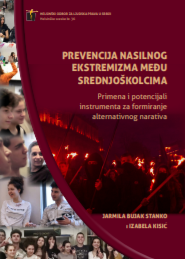
HELSINŠKE SVESKE №04: Universal and Collective Rights of Minorities
HELSINŠKE SVESKE №04: Universal and Collective Rights of Minorities
Keywords: Serbia;rights and freedoms; minorities; round-table; multicultural; cohabitation; autonomy;
In view of the key importance of inter-ethnic relations and status of national minorities in Serbia for development of democracy, Helsinki Committee for Human Rights in Serbia, Centre for Regionalism, the Vojvodina Club and Centre for Multiculturality have organised the round-table "National Minorities in Serbia" on 8 and 9 September 2000 in Novi Sad. Participants in this round-table were representatives of several dozen NGOs from Vojvodina and Serbia, representatives of political parties, prominent public personalities and experts for minority rights and ethnic relations. In a two-day debate participants in the round-table underscored that peace, tolerance and democratization of the society represent the basic prerequisite of the exercise of individual and collective rights and freedoms in the Republic of Serbia. Considering that a social community in the Republic of Serbia has a markedly heterogeneous cultural character and the fact that it is faced with pronounced ethnification of politics and intolerant nationalism, our discussion confirmed that the majority nation, that is, the ruling political establishment, were to be blamed for such a poor status of inter-ethnic relations. Hence the current political authorities cannot be relieved of responsibility from catastrophic consequences of internal conflicts and external and internal isolation. After analysing institutions and real social and political processes and actions of the most influential political protagonists, it was established that we all must insist on comprehensive implementation of ideas and legal-constitutional norms determining the Republic of Serbia as a state of equitable citizens, and the one guaranteeing corresponding standards in attainment and exercise of collective rights of national minorities in Serbia. Unfortunately during our discussion we identified through a host of examples a pronounced gulf between proclaimed norms and concrete reality in the sphere of protection of national minorities rights, notably in development and expression of their cultural identity. After the SFRY disintegration, the problem of "new minorities", notably Croats, Bosniaks, and Macedonians, emerged in Serbia. This problem entails official recognition of those minorities and concrete legal regulation of their status and rights. During preparations for the 2001 census scientific and cultural institutions and representative bodies should lay the groundwork for facilitating the free declaration of nationality by citizens. This particularly applies to Bosniaks, who have been deprived of that right to date. It is also expected that the democratic opposition of Serbia shall take a clear public stand on manner of resolution of minority problems, and incorporate pertinent proposals into their program of changes, offered as an alternative to the current regime. We brought into prominence the need to revive earlier initiatives for adoption of the Act on National Minorities in the Republic of Serbia, aimed at removing current shortcomings and imprecise points, and boosting harmonisation of domestic legal and political practice with the European standards on the Protection of Minorities. Our discussion indicated that the Republic Serbia in its relations with almost all neighbouring countries disregards the issue of minorities, and that this negligence is in turn reflected in the status of minorities and has a negative impact on relations between the majority and minorities. The role of ecological issues was discussed in the context of good-neighbourly relations, for they alike the minority issue clear the way for establishment of broad and efficient communications. Considering regional trends within the context of Europe those two issues can play an important role in the inclusion of Serbia in the project of European regions. Participants think that the Stability Pact is a conceptual framework for analysis of the most important problems and devising models of their resolution.
More...


















